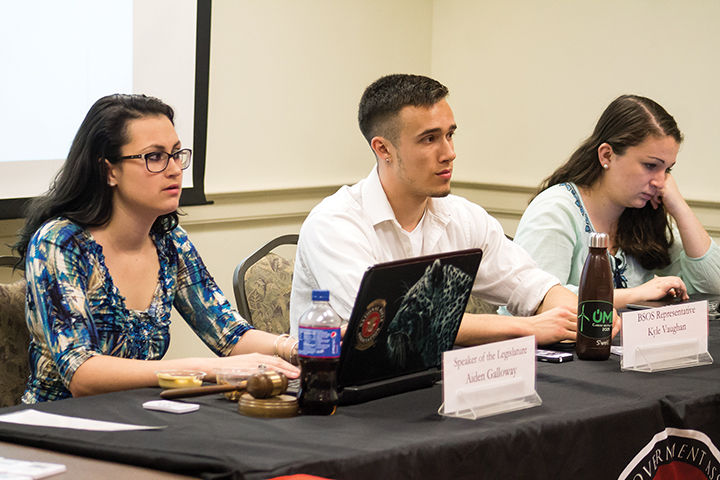
SGA members Aiden Galloway, Kyle Vaughan, and Deborah Berlin preside over the SGA meeting held on April 15, 2015 in the Benjamin Bannker Room.
The SGA unanimously passed a resolution Wednesday night supporting a proposal to revise the Code of Student Conduct following the surfacing of a racist, sexist email sent by a former Kappa Sigma fraternity member in January 2014 that went viral in March.
The resolution passed 16-0, with no abstentions.
The proposal — which highlights potential University of Maryland policy changes, such as creating a campuswide protocol to address cases of hate speech and making changes to Greek life expectation requirements — is a step toward helping the university community recover, said Student Government Association President Patrick Ronk.
“This proposal is a way to show students that we need to move forward in a productive way, and we need to heal,” Ronk said.
The policy changes are largely focused on the idea of education over punishment when dealing with students connected to hate speech, Ronk said.
“We hear [student] concerns about how the student wasn’t punished,” Ronk said. “This proposal is about making the student body a better, more inclusive environment — more than just punishing people.”
Proposed policies include hosting talks with the affected groups to show the student the harm he or she has caused, having the student write a public apology to the university community and making the student involved, as well as other affiliates, engage in sensitivity training and take additional classes relevant to the issue, according to the proposal.
“Multiple students received this email and did not take the responsibility to report it,” the proposal states. “This implies a culture of reinforcement by those affiliated.”
The proposal also included a recommendation to the university to continue working with Greek life on openness and inclusion, as well as a suggestion to expand the existing Resident Life policy concerning racial slurs, sexist comments and generally derogatory language to all campus departments.
Ronk said the SGA provided university President Wallace Loh and other administrative members with a draft of the proposal after a town hall meeting two weeks ago.
Brian Ullmann, this university’s marketing and communications assistant vice president, confirmed in a statement that the administration has the proposal, and the Office of the General Counsel and Office of Student Conduct will review the suggested changes.
“A University is an ideal place for new ideas and frank discussion and debate on issues important to us all,” Ullmann wrote. “We will always applaud and encourage students who speak up for what they believe in.”
Because the University Senate has to vote in favor of policy changes before they can reach Loh’s desk, SGA shared governance director Ryan Belcher said the next step following the bill’s passage is creating a formal proposal to present to the senate.
The senate proposal will also be sent to Loh, Andrea Goodwin, student conduct director, and Linda Clement, student affairs vice president, Ronk said.
Belcher said the senate, if it chooses, could task its Student Conduct Committee with looking into the policy changes and creating a report to present to the Senate Executive Committee.
“We want the campus input, so in making sure the senate starts considering this relatively soon, essentially right at the start of next year’s academic cycle, we can start getting that process moving forward officially,” Belcher said, noting it could take up to a year for the senate to render a final decision.
Both Ronk and Belcher said the biggest roadblock in trying to enact a university hate speech policy that narrowly defines hate speech and includes it as a Code of Student Conduct violation is the fact that hate speech is generally protected under the First Amendment.
The SGA proposal said it sought to create a university-defined concept similar to fighting words — defined as written or spoken words meant to incite hatred or violence — for hate speech, since fighting words are not protected under the Constitution.



